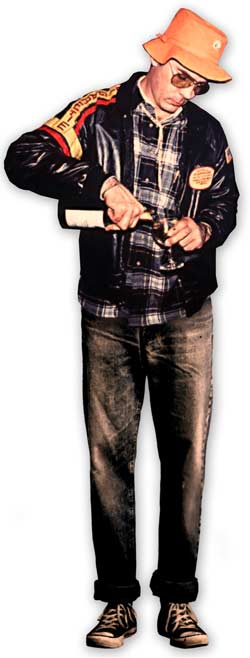Hunter Stockton Thompson was a singular sort of creature—this, dear reader, you already knew.
Uncompromising in both his work and way of life, he left a mark on American literature that can never be removed. His influence is tattooed on the canon right down to its very muscle, whether the freaks who coronate the so-called greats agree with that assessment or not.
 Hunter S. Thompson is familiar, to the casual reader, perhaps more for a film made from his work than the work itself; only the most rakish teachers assign their students Fear and Loathing in Las Vegas. It’s less of a shame than a missed opportunity—in my opinion, to this day, no one writes like he used to.
Hunter S. Thompson is familiar, to the casual reader, perhaps more for a film made from his work than the work itself; only the most rakish teachers assign their students Fear and Loathing in Las Vegas. It’s less of a shame than a missed opportunity—in my opinion, to this day, no one writes like he used to.
Thompson did not speak plainly—he spoke apocalyptically, describing the world with metaphors of fire and ash. A loathsome politician wasn’t just a waterhead—they were the devil made flesh. The evils of the world weren’t bureaucratic—they were biblical. Polo is life—the Kentucky Derby is decadent and depraved.
As an adolescent reader, his writing made me realize a crucial literary truth, that being that there is nothing more valuable to a reader than a writer who communes with them—who understands without asking that the person at the other end of their prose is almost always smart enough to follow them down any path, no matter how circuitous or thorny. Thompson is far from the only writer who does this—but he’s the one whose writing taught it to me.
I’ve read every blessed word of Thompson’s, from his early attempts at doing Hemingway to his sports columns as a proto-blogger. The most valuable work of his, I believe, is Fear and Loathing on the Campaign Trail ’72, I book I’ve read and re-read, always wishing there was a similar companion for every presidential campaign since.
When it came to journalism, Thompson made accuracy optional. The truth of what happened is one thing—the truth of what it means is quite another. He found the real in surreality. Even his utter failures of journalism—like the Muhammad Ali fight he essentially slept through—contained kernels of some harsher truth than the who-what-where-when-why. His writing slit reality like the belly of a pig and invited you to play in the entrails, rutting around impishly with him to claw at the heart of things.
I won’t laud the man with hollow praise. I never met him, and he probably wouldn’t have liked me. The words are all that matters because the words are all that’s left, the only earthly traces of him now being subatomic mulch in the dirt of Woody Creek. He was the scribe who realized that there is no such thing as objectivity and attempting to strive for it is the cruelest kind of lie. You don’t need me to draw the connection for you from that viewpoint to our modern times. That was also an important lesson. I learned the drug abuse myself.










